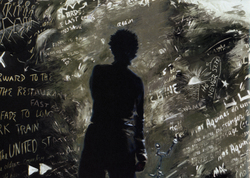
When Laurie Anderson talked to a large and expectant audience at the Michigan Theater on Thursday January 13, before her performance at the Power Center the following weekend, it must have clear to everyone present how original she was in her thinking --- and how the promise of that originality of thought is translated into her out-of-the-box performances. Two of the things that she said in course of her talk at the Michigan Theater especially struck me.

The first concerned scale: she said that while digital art (like the multimedia performances she has become famous for) is increasingly more convenient to create using computers, what this kind of work lacks is a sense of scale. Mentioning that she started her artistic career as a sculptor, she said that that early training had ingrained in her a respect for scale, because sculptors work directly with physical material in three dimensions. What she is trying to do with her multimedia performances now, she said, was to attempt to introduce a sense of scale. Perhaps one way of thinking about this is that she is trying to mingle reality with virtuality.
The second comment made by Anderson at her Michigan Theater talk that struck me had to do with her statement that she was tired of the production of more and more conventional artifacts in the name of art. This, one suspects, has probably made her turn to multimedia performances, for performances are not artifacts: rather than commodities, they exist ethereally, only in performance. Her impatience with conventional artifacts found yet more expression in her talk when she decried how used we have gotten to staring at rectangular screens all day: the computer screen, the television screen, and even the screen on which a film is projected, are all variations of the same boring rectangle, after all. That she is trying to get beyond this is apparent in Delusion, in which there are at least three oddly shaped "screens" onto which images are projected: a crumpled-looking screen, another which is non-rectangular, and even, oddly enough, a curiously undefinable object that looks somewhat like a love seat, on which, in fact, Anderson appeared to sit during parts of the performance.
If parts of Delusion, with its often surrealistic imagery, stream-of-consciousness narrative, and Anderson's adoption, from time to time, of the baritone voice of her male alter ego, Fenway Bergamot, might have seemed bewildering and disjointed to the audience at times, it perhaps helps to think of the performance, as Jenn McKee writes in annarbor.com, as "a collection of some of Anderson’s most vivid dreams." Some comments by Anderson about the show, which were published in the Metro Times a few days before the Ann Arbor performance, are also quite insightful in trying to grasp what she was trying to do in the show, and why.

